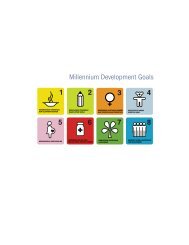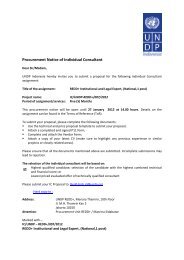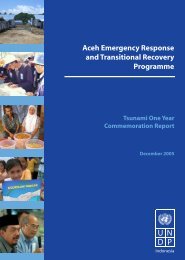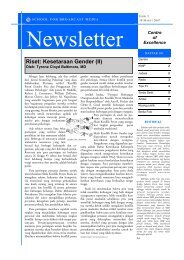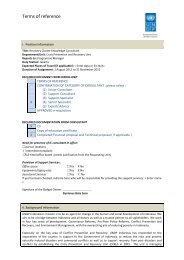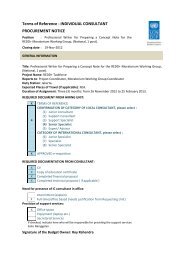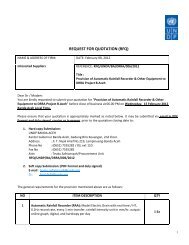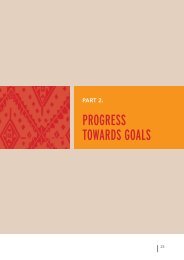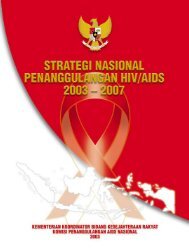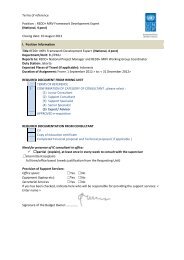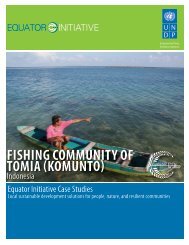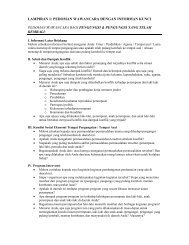Indonesia Human Development Report 2001 - UNDP
Indonesia Human Development Report 2001 - UNDP
Indonesia Human Development Report 2001 - UNDP
Create successful ePaper yourself
Turn your PDF publications into a flip-book with our unique Google optimized e-Paper software.
A new macroeconomic environment<br />
At the same time <strong>Indonesia</strong> was increasingly exposed<br />
to the demands and moods of the international money<br />
markets.<br />
• Savings and investment – In the 1990s <strong>Indonesia</strong>'s<br />
savings-to-GDP ratio reached an upper ceiling of around<br />
29%. Further investment will probably have to come from<br />
foreign portfolio investment – with the attendant risks of<br />
volatility.<br />
• Exchange rate management – The more <strong>Indonesia</strong><br />
depends on foreign capital the more its exchange rate and<br />
its growth rates will fluctuate.<br />
• Monetary and fiscal policy – Efforts to control inflation<br />
have concentrated on constraining public expenditure<br />
– with serious implications for human development.<br />
It might be better to accept a higher level of inflation which<br />
might hurt the poor less than cuts in public services.<br />
Rebuilding the <strong>Indonesia</strong>n miracle<br />
If <strong>Indonesia</strong> is to rekindle both economic and human<br />
development, it will have to build a different economic<br />
structure. Thus far the government has resisted the<br />
temptation to try to insulate itself from global pressures<br />
and has shown a resolute determination to maintain open<br />
regimes. This is the only feasible option. If <strong>Indonesia</strong> is<br />
to progress economically it will have to engage in a third<br />
round of industrial diversification, stepping up the<br />
technology ladder to produce goods that embody higher<br />
levels of productivity. And most of this innovation will<br />
have to come from the stimulus of foreign investment<br />
and technology transfer.<br />
With an open and more capital-intensive economy,<br />
however, <strong>Indonesia</strong> is almost certainly going to see a further<br />
increase in inequality. And if the current pattern of<br />
distribution of industrial activity remains the same – with<br />
most concentrated in Java – then there are likely to be<br />
greater disparities between different provinces and<br />
districts.<br />
Rekindling <strong>Indonesia</strong>'s economic miracle will mean<br />
achieving higher levels of productivity but also doing so<br />
within the kind of stable social and political environment<br />
on which productive enterprises rely. Fortunately both<br />
objectives can be achieved through the same basic policy<br />
– substantial and sustained investment in human<br />
development. Without a more highly qualified workforce,<br />
<strong>Indonesia</strong> will be unable to benefit even from the lowerlevel<br />
spin-off effects of higher technology production.<br />
And without delivering better standards of health and other<br />
social services, social unrest is likely to persist.<br />
This will require much greater investment in education.<br />
<strong>Indonesia</strong> is spending only around 1.4% of GNP on<br />
education, compared with a global average of 4.5%. Health<br />
should also be a priority. This is not just a question of<br />
providing better health services. Even some of the more<br />
basic needs like sanitation are not being met –<br />
compromising not just the health but also the nutritional<br />
standards of <strong>Indonesia</strong>'s children. Another emerging issue<br />
is social protection, and in particular some form of<br />
unemployment insurance.<br />
<strong>Indonesia</strong> now has to pursue human development,<br />
while deep in debt, restructuring its economy, and coping<br />
with a more competitive and unstable economic<br />
environment. The key, however, is to recognize how all<br />
these issues connect – the social, the economic and the<br />
political – and to bring this recognition to the forefront of<br />
public consciousness.<br />
Putting people first: A compact for regional<br />
decentralization<br />
<strong>Indonesia</strong> urgently needs to build a new social<br />
consensus. Already there has been a fundamental shift in<br />
values and perceptions – and an explosion in expectations:<br />
millions of people sense the possibility for a different kind<br />
of future both for themselves and for <strong>Indonesia</strong> in the<br />
world. In short they have become more aware of their<br />
rights – not just political rights but ‘economic’ rights – to<br />
food, say, or to health, or to work. When people emphasize<br />
their regional or ethnic identity they are not just demanding<br />
greater autonomy or political freedom, they are also saying<br />
that some of their most basic social and economic rights<br />
have yet to be fulfilled.<br />
How can the Government of <strong>Indonesia</strong> possibly afford<br />
to fulfil such rights? Similar doubts have arisen in poor<br />
countries all over the world, where the promotion of<br />
economic rights has foundered on the hard question of<br />
who has a duty to fulfil them. But all rights do not have to<br />
be paired with corresponding duties. A better approach is<br />
to see the assertion of rights as the first step towards<br />
fulfilment and of building acceptance and support.<br />
In future, more of these rights are going to have to be<br />
fulfilled at the district level. <strong>Indonesia</strong> has embarked on a<br />
radical programme of decentralization that has raised a<br />
host of difficult questions – particularly about the fiscal<br />
relationship between the centre and the regions – as well<br />
as the prospect of widening gaps if the better endowed<br />
districts can pull further ahead of the rest of the country.<br />
How can <strong>Indonesia</strong> ensure that decentralization does<br />
indeed cement national cohesion and deepen national<br />
commitment to human development? One option is to<br />
establish a new social compact: an agreement that all<br />
<strong>Indonesia</strong>ns – as <strong>Indonesia</strong>ns – are entitled to nationally<br />
mandated standards of human development. With these<br />
EXECUTIVE SUMMARY<br />
3



